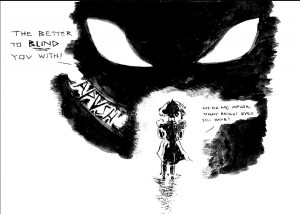Changes to APUSH foster political bias
College Board recently announced changes for the Advanced Placement United States History exam effective fall 2014, a shift that has gained national attention. College Board is a private company that sponsors college entrance exams for students nationwide. The company is most well known for the SAT, a standardized test that measures students’ probability of success in college. Similar to the SAT, AP exams are administered by College Board to test a student’s ability to master college-level coursework in high school.
Though adjustments are part of the improvement process, these new changes to the AP U.S. History exam significantly alter the way history is portrayed to high school students -— in a dangerous way. It is difficult for history to be taught in a way that is completely unbiased, but the changes listed in the new framework establish an overpowering anti-American sentiment based on the representation of America in its worst conditions. The new exam emphasizes American history with reference to racism, false views of superiority over other countries and failure to establish democratic institutions in a timely manner.
When the major reforms to the framework for the exam were announced in July, teachers were told to keep the new structure a secret. It was not until the changes sparked a national debate that College Board president and CEO David Coleman decided to release a full practice exam to the public. Interestingly enough, Coleman happens to be a key player and creator behind the Common Core State Standards Initiative. Common Core, a state-led bipartisan initiative, was created in hopes of increasing the high school graduation rate. It provides a set of guidelines for schools to direct formal education with a special focus in mathematics and English. A large change in relation to the old AP U.S. History exam is based on the elimination of rote memorization. For some time now, states have been pulling closer toward the ideals of the Common Core that emphasize conceptual learning.
California State Senator and major advocate of educational reform Mark Wyland (R-Escondido) discussed the overarching presence of distorted Common Core standards in today’s K-12 educational system.
“If you look at Common Core standards that they are drawing this from, there is absolutely no actual content in those standards — it is only about analysis. It is very, very clear that if you discuss an issue, it should present both sides or all sides of an issue,” Wyland said. “To the extent that a test or curriculum was biased in any way, it’s actually a disservice to students and does not conform to how Common Core is supposed to be. Now, you cannot really look at K-12 education without addressing a part of the Common Core.”
The questions in the new AP U.S. History exam contain pre-existing viewpoints on the way history occurred. It requires students to critically expand on set topics by accepting the viewpoint stated in the question and by supporting it with further evidence. Most of the material in the new exam lacks ideas rooted in American exceptionalism. The changes seem minimal because concepts with regard to an anti-American bias are carried out in a discreet manner.
Though subtle, the issues with the changes are most present in the wording of the questions and topics. The examples that are primarily listed on page 37 of the framework impose the idea of American racial superiority in favor of the foreign settlers. In addition, the curriculum suggests a firm structure of hierarchy, with the Puritans living in a homogenous society and great ignorance on behalf of the English. What the exam fails to mention are the legacies of American heroes who overcame such injustice.
The changes seen in the AP U.S. History exam have continued to spark national debate among teachers, students, religious leaders and state legislators who are unsupportive of the changes.
After a board meeting on Sept. 18, students led a protest at Jefferson High School in Edgewater, Colorado, demanding history to be taught without a political bias. Additionally, students and teachers across the nation addressed their concerns by skipping instructional periods.
Students must learn history through the lens of America’s Founding Fathers to understand various motives and events. To learn the rich stories the past has to offer, future generations shouldn’t begin to believe this form of analysis constitutes thorough awareness of the topic. Rather, students should be taught in a way that encourages analysis in all areas of historical matter, preparing them to realize that even seemingly unimportant and small segments of history are worth learning.



Believe it or not, dear author, despite its greatness, America is not always right. There is nothing inherently anti-American about recognizing mistakes we have made or dark times the country has gone through and insisting that people be aware of them. The only unbiased history is one that makes its pupils equally of both the good and the bad, both the so-called “American heroes” you mention as well as the racism and false views of superiority that you also mention.
To your credit, you do seem to believe in the importance of “[realizing] that even seemingly unimportant and small segments of history are worth learning.” But you also fail to realize that it’s the very American exceptionalism that you seem fond of that drowns out the opportunity to learn about such things. You gripe that the exam is biased yet you complain that the exam lacks ideas rooted in American exceptionalism… you do realize that to HAVE such ideas would indicate a bias, not the other way around? That American exceptionalism in and of itself is bias? That content rooted in American exceptionalism would also lead to the very “pre-existing viewpoints on the way history occurred” you complain of?
Perhaps there are valid issues with the new APUSH exam, but I don’t think this article does a great job of articulating them and manages to itself sound biased.